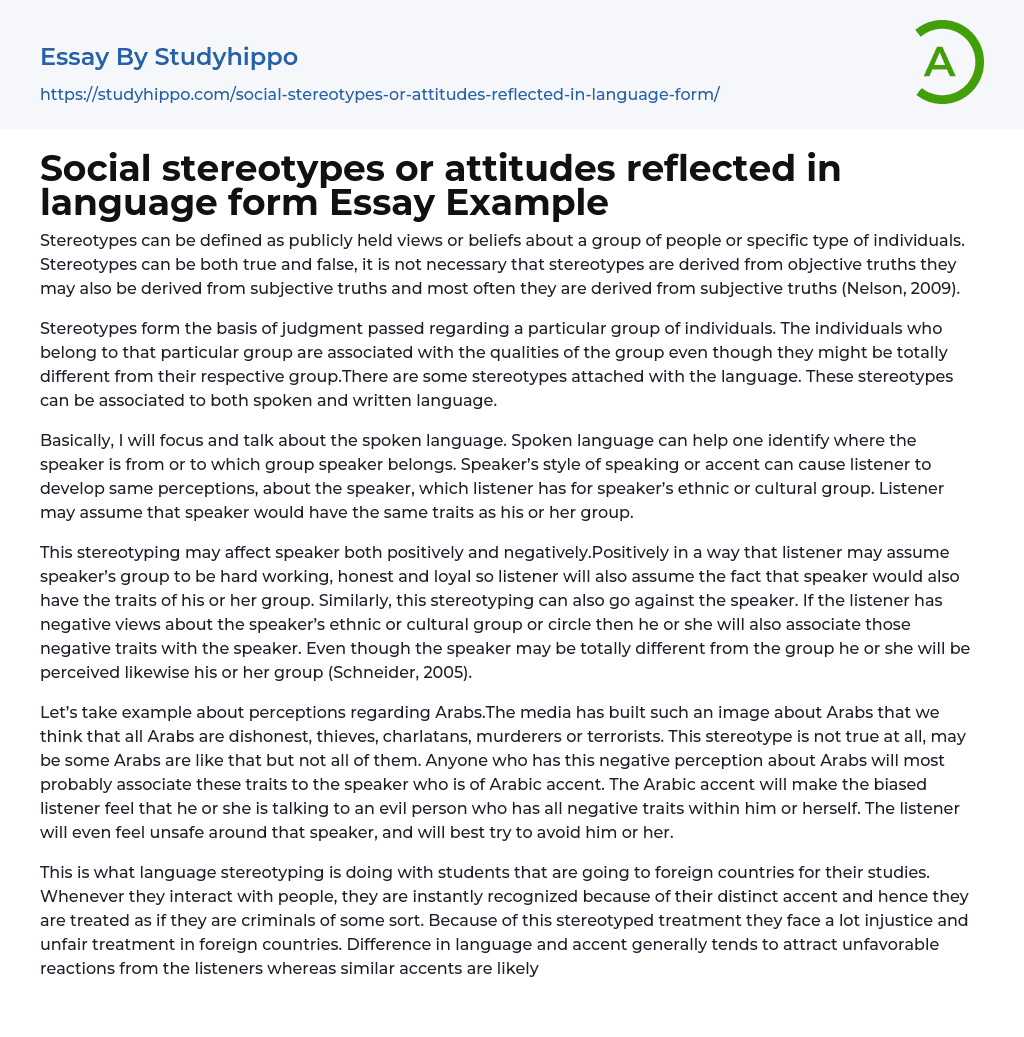

Social stereotypes or attitudes reflected in language form Essay Example
According to Nelson (2009), stereotypes are commonly held beliefs or views about a certain group or type of individuals. These beliefs can be accurate or inaccurate and may come from both objective and subjective truths, although they tend to stem more often from subjective ones.
The judgment that people make about a specific group of individuals is based on stereotypes. Even if individuals within the group are different, they are still associated with the qualities of their group. Language is subject to stereotypes, which can be related to both written and spoken language.
In essence, my focus and discussion will revolve around spoken language. Spoken language has the ability to reveal a speaker's origin or group affiliation. The way a speaker speaks or their accent can lead a listener to form similar perceptions of the speaker's ethnic or cultural backg
...round. This may cause the listener to assume that the speaker possesses the same characteristics as their group.
Both positive and negative impacts can arise from stereotyping. On the positive side, listeners may perceive speakers' groups as hardworking, honest, and loyal, which can extend to the speaker's personal traits. However, stereotyping can also have negative effects. If a listener holds negative views towards a speaker's cultural or ethnic group, those negative traits may be associated with the speaker. This perception can occur even if the speaker is vastly different from their group (Schneider, 2005).
The media has created a negative stereotype of Arabs, portraying them as dishonest, thievish, and even murderous. However, this perception is largely untrue and unfair. While some Arabs may possess these traits, not all of them do. Those who hold
onto this negative image of Arabs will likely associate these qualities with anyone who speaks with an Arabic accent. The listener's bias will lead them to view the speaker as a dangerous individual with all of these negative traits. Consequently, the listener may feel unsafe and choose to avoid interacting with such a person.
This is the impact of language stereotyping on students studying abroad. They face unfavorable treatment due to their distinct accent and are often treated unfairly as if they have committed some crime. The differences in language and accent lead to negative reactions from people, while similar accents receive positive treatment.
Individuals who possess a foreign or unconventional accent often encounter discrimination in various aspects of their lives, including education and employment. In comparison, those with a standard or familiar accent are more likely to receive preference and support. Despite the unwarranted nature of this bias, it persists worldwide. Numerous studies have investigated social stereotyping and language-based attitudes, revealing various insights into perceptions of standard and foreign accents. A study by Sen uncovered that individuals with unique accents are frequently viewed as socially unappealing, inarticulate, grammatically deficient, contextually inappropriate, and linguistically flawed. However, they are also regarded as possessing positive personality traits such as humor, sociability, likability, self-confidence, and reliability.
Sen's (n.d.) study indicates that a person's language and accent hold more sway over their image than their personal qualities. Listeners ultimately perceive individuals based on their accent, regardless of any other admirable traits they may possess. Banks (1999) argues that it is unjust to judge people based on these factors, and that everyone deserves respect and praise, irrespective of age, gender, origin, race
or language.
Although foreign or unfamiliar accents might give the impression that someone is socially unacceptable, it would be unfair and harsh to judge them without personally knowing them. It's important to provide people with such accents a chance to demonstrate their skills, behaviors, morals, and values. If they excel in these critical aspects, they should receive equal respect, importance, status, love, and care as native speakers do. Foreigners are human beings who grew up in different environments and cultures; nevertheless, they drink the same water, eat the same food and breathe the same air as everyone else.
- Attitude essays
- Goals essays
- Personal Goals essays
- Personal Life essays
- Personality essays
- Principles essays
- Reputation essays
- Self Awareness essays
- Self Esteem essays
- Self Reflection essays
- Self Reliance essays
- Strengths essays
- Value essays
- Values essays
- Weakness essays
- Who Am I essays
- Consciousness essays
- Intelligence essays
- Mindset essays
- Perception essays
- Problem Solving essays
- Resilience essays
- Anthropology essays
- Audience essays
- Charity essays
- Cultural Competence essays
- Emile Durkheim essays
- Gender Roles essays
- Generation essays
- Globalization essays
- Interpersonal Relationship essays
- People essays
- Race essays
- Social Change essays
- Social Class essays
- Social Movement essays
- Social Science essays
- Social Status essays
- Social Stratification essays
- Society essays
- Sociological Imagination essays
- Sociological Perspective essays
- Sociological Theories essays
- Stereotypes essays
- Web Dubois essays
- Acceptance essays
- Age Of Enlightenment essays
- Child Observation essays
- Confucianism essays
- Conscience essays



